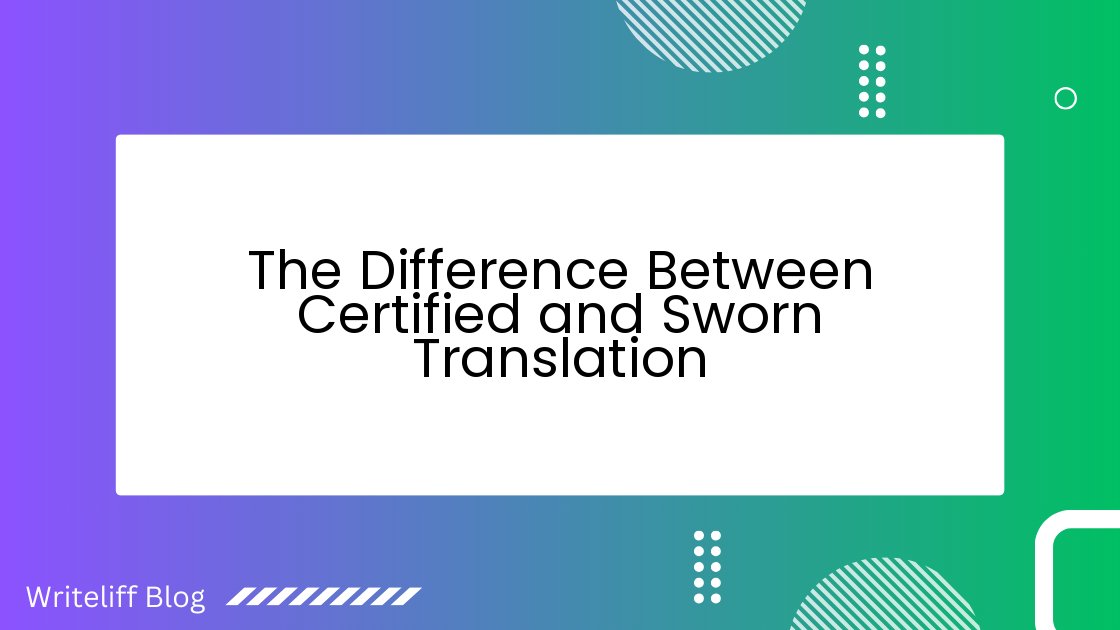The Difference Between Certified and Sworn Translation

When you’re dealing with important documents that need translation, you might come across terms like “certified translation” and “sworn translation.” But what exactly do these mean? Are they the same thing? Let’s dive into the world of official translations and uncover the key differences between certified and sworn translations.
What is Certified Translation?
Certified translation is a process where a professional translator verifies the accuracy of their translation. They attach a signed statement, often called a “Certificate of Accuracy,” to the translated document. This certificate confirms that the translation is complete and accurate to the best of the translator’s knowledge.
Here’s what you need to know about certified translations:
- They’re often required for official purposes, like immigration or legal matters
- The translator doesn’t need to be “sworn” or take an oath
- Many countries, including the United States, use this system
Understanding Sworn Translation
Sworn translation, on the other hand, involves translators who have taken an official oath before a court or government body. These translators are often called “sworn translators” or “court interpreters.” Their translations carry legal weight and are considered official documents in their own right.
Key points about sworn translations:
- Common in many European and Latin American countries
- Translators must pass special exams and meet strict requirements
- Their translations are automatically considered legally valid
The Main Differences
Let’s break down the main differences between certified and sworn translations:
| Aspect | Certified Translation | Sworn Translation |
|---|---|---|
| Legal status | Varies by country | Legally binding |
| Translator qualification | Professional translator | Sworn translator |
| Verification process | Certificate of Accuracy | Official stamp and signature |
When Do You Need Certified Translation?
Certified translations are often required in various situations. You might need one when:
- Applying for a visa or immigration
- Submitting academic records to foreign institutions
- Dealing with international legal matters
For example, if you’re applying to a U.S. university and your transcripts are in Spanish, you’ll likely need a certified English translation. The university can trust that the translation accurately represents your academic achievements.
When is Sworn Translation Necessary?
Sworn translations are typically needed in countries that recognize this system. You might need one for:
- Court proceedings in certain countries
- Official government documents
- International business contracts
For instance, if you’re getting married in Spain and your birth certificate is in English, you’ll need a sworn translation into Spanish. This ensures that the Spanish authorities can accept the document as legally valid.
The Translation Process: Certified vs. Sworn
The process for getting a certified translation is relatively straightforward. You submit your document to a translation service, and a professional translator translates it. They then attach their certificate of accuracy. The whole process can often be completed quickly, sometimes even within 24 hours.
Sworn translation, however, involves more steps. The sworn translator must carefully review the document, translate it, and then apply their official stamp and signature. This process can take longer and may be more expensive due to the translator’s special status.
Quality and Accuracy Considerations
Both certified and sworn translations aim for high accuracy. However, there are some differences in how this is ensured:
- Certified translations rely on the translator’s professional reputation
- Sworn translations have additional legal backing
It’s important to note that being sworn doesn’t automatically make a translator more skilled. The key is to choose a reputable translation service, regardless of whether you need a certified or sworn translation.
Cost Factors
Generally, sworn translations tend to be more expensive than certified translations. This is due to several factors:
- Sworn translators have undergone additional training and certification
- The legal weight of sworn translations often requires more time and care
- There are typically fewer sworn translators available
However, the cost can vary depending on the document’s length, complexity, and urgency. Always get a quote before proceeding with any translation service.
Choosing the Right Translation Service
When you need an official translation, it’s crucial to choose the right service. Here are some tips:
- Check if you need a certified or sworn translation for your specific purpose
- Look for translators with experience in your document type
- Read reviews and ask for recommendations
If you’re unsure about what you need, don’t hesitate to ask. Our customer support team at Writeliff can guide you through the process and ensure you get the right type of translation for your needs. Check out our online certified translation services for more information.
Key Takeaways
- Certified translations include a certificate of accuracy from the translator
- Sworn translations are performed by translators who have taken an official oath
- The choice between certified and sworn translation often depends on the country and purpose
- Both aim for high accuracy, but sworn translations carry more legal weight
- Sworn translations are typically more expensive due to the translator’s special status
Final Thoughts
Understanding the difference between certified and sworn translations can save you time, money, and potential legal headaches. Whether you need a certified translation for your U.S. visa application or a sworn translation for a European court case, knowing what to ask for is half the battle.
Remember, the most important thing is to get an accurate, reliable translation that meets your specific needs. Don’t be afraid to ask questions and seek guidance from professional translation services. They’re there to help you navigate these sometimes confusing waters.
So, the next time you’re faced with a document that needs official translation, you’ll be well-equipped to make the right choice. And if you’re ever in doubt, professional translation services are just a click away, ready to assist you with all your translation needs.